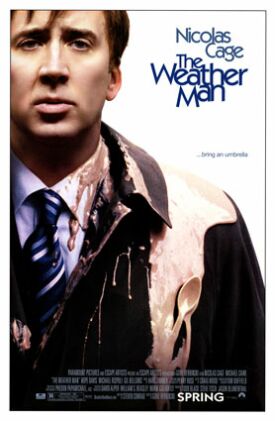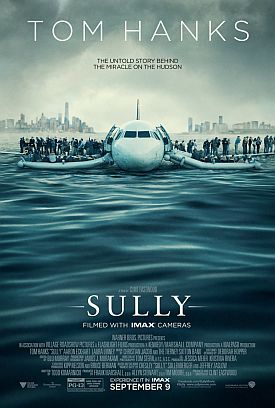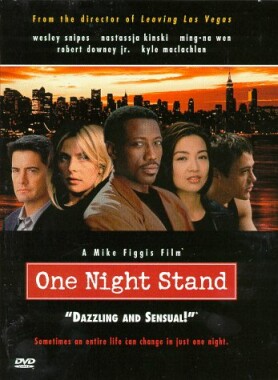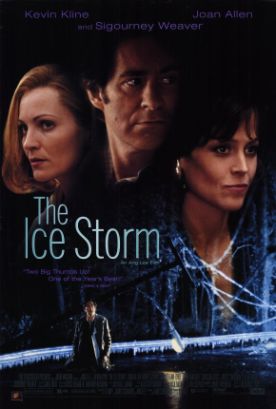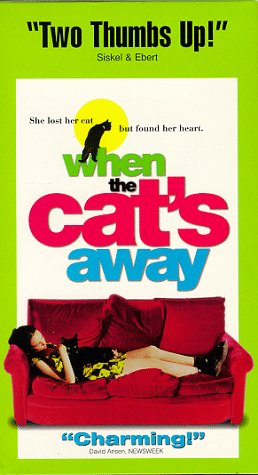Weather Man, The
That The Weather Man, directed by Gore Verbinski (Mousehunt, The Ring, Pirates of the Carribean) from a script by Steve Conrad, strains at profundity without attaining it is of course no surprise. But the reasons why it fails are many and instructive. One is that it is a movie about celebrity for celebrities. Not much depth there then. Celebrities need to feel good about themselves too, though, and Messrs Verbinski and Conrad are here to make that happen. Their hero, Chicago TV weatherman Dave Spritz (Nicholas Cage), experiences minor celebrity in the shape of people throwing fast food at him in the street. Things can only get better, you think, but by the end you may want to throw things at him too.
For the main reason that the film doesn’t work is that Dave is way too shallow to express anything profound. Not only do several people describe Dave as an a******, including his wife Noreen (Hope Davis); not only do we see a number of instances in which he behaves like an a******, but he himself seems to recognize this about himself while being more or less helpless to do anything about it. As if to advertise the pathetic smallness of the distance traveled on this spiritual odyssey of an a******, Dave’s story is bracketed by two encounters with autograph seekers. To the one at the beginning he is rude; to the one at the end he is nice. There you have it, folks, as profound a spiritual transformation as you can expect from a TV weatherman in the movies.
Actually, we know that’s not true. For the film invites comparison with the greatest ever picture about a TV weatherman, Groundhog Day (1993). Its hero, Phil Connors (Bill Murray) is every bit as shallow as Mr Cage’s Dave, but by making him live the same day over and over again the film forces him into a course of soul-dredging to which Dave never comes close. Thus Phil’s dreams of a national network slot are forgotten by the time he learns to appreciate the ordinary folk of Punxsutawney, Pennsylvania. Dave, a celebrity wannabe to the last, ends up as the weather man on Bryant Gumbel’s “Hello, America” — but he makes Bryant wait before he says yes!
The popularity of local TV news people with Hollywood — we could also mention To Die For (1995), Lucky Numbers (2000) and Anchorman: The Legend of Ron Burgundy (2004) — is that they are so easy to patronize. Just like the stars who play them — Nicole Kidman, John Travolta and Will Ferrell in the three examples above — they are celebrities of a sort. But very small celebrities. Celebrities who didn’t make the big time. That’s what makes it especially delicious for the stars who did make it to play them as dummies. Yet if there is an element of self-congratulation in the portrayal of stupid TV newscasters, there is also an element of self-contempt. Deep down inside, the stars know that what they do isn’t all that different from what their moronic alter egos do. Here’s how Dave Spritz puts it: “I receive a large reward for pretty much zero effort and contribution. That’s why people throw shakes at me.”
Not really. Rather, that’s why people make movies about him. The shake-throwing is never quite believable. Supposedly it happens all the time, but it really just provides the occasion for one of Dave’s meditations in self-loathing. They also throw fast food at him, he thinks, because “I am fast food.” It is one way to express the love-hate relationship between people and their celebrities, but so is the movie. Dave’s relations with soon-to-be ex-wife Noreen and his two troubled children, Mike (Nicholas Hoult) and Shelley (Gemmenne de la Peña), are reassuringly difficult and so help to bring him down to earth — which is where we insist our celebrities should be. The same is true of Dave’s feelings of inferiority vis à vis his dying father, celebrity author Robert Spritzel (Michael Caine). But from that source he also gets the words of wisdom that reach after profundity.
“To get anything of value you have to sacrifice,” says dad without apparent irony. “Do you know that the hardest thing to do and the right thing are usually the same thing? ‘Easy’ doesn’t enter into grown-up life.”
Oh, please. In the context, these are just words. A rich and famous author is advising a rich and famous TV presenter that he’s got to sacrifice? What sacrifice do we see either of them make? Dad’s got to die and Dave’s got to get divorced, but it’s not something that either of them has chosen. And in Dave’s case the pill is sugared with a move to New York, national fame and a million bucks a year. The only profound insight on offer in this deeply disappointing film is that celebrities want to believe that they are ordinary people as much as we want to believe it of them. But it’s also pretty clear they’re not.
Discover more from James Bowman
Subscribe to get the latest posts to your email.

